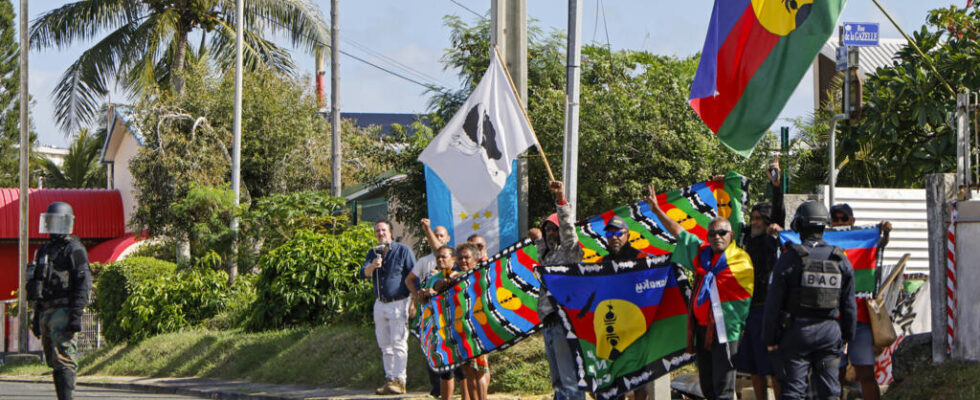The executive made an additional gesture in New Caledonia, by scheduling a lifting of the state of emergency but the calm remains very relative after two weeks of riots. The curfew is maintained and 480 mobile gendarmes will be sent to the archipelago in the coming hours.
4 mins
The state of emergency, established on May 15, will be lifted on Tuesday at 5 a.m. Nouméa time (8 p.m. Monday in Paris), announced the Élysée.
The lifting of these exceptional measures must “ allow meetings of the different components of the Kanak and Socialist National Liberation Front (FLNKS) and travel to the roadblocks of elected officials or officials able to call for their lifting », Specified the presidency in a press release.
At the same time, sending “ seven additional mobile force units, i.e. 480 mobile gendarmes » is announced “ in the next few hours “.
On site, the High Commission of the Republic for New Caledonia announced “ the maintenance of general measures, in particular the ban on all travel on the road and in public places throughout the territory from 6 p.m. to 6 a.m. “.
Exceptions are granted for health reasons or public service missions. The sale of alcohol remains prohibited, as does the transport and carrying of weapons – estimated at around 100,000 in the archipelago.
In total, some 3,500 security forces will be deployed on this archipelago of some 270,000 inhabitants.
Since the start of the crisis, seven people have died, including two gendarmes. The High Commission reports that 122 police officers and gendarmes were injured and 460 people arrested.
A controversial reform of the electoral body
The detonator of the unrest was the vote in Paris for a reform providing for expanding the local electorate to around 25,000 people established for at least ten years in New Caledonia. A casus belli for the separatists who demand the withdrawal of the text which caused the worst violence in 40 years and awakened the specter of the “Events” which, from 1984 to 1988, had left nearly 80 dead and fear the plunge of New Caledonia into the civil war.
On Thursday, the head of state, during his visit to New Caledoniaannounced that there would be “ no forced passage ” but ” no going backe “.
Traveling to Berlin on Sunday, Emmanuel Macron was led to qualify his remarks Parisian on the possibility of organizing a national referendum on the unfreezing of the electoral body, which sparked new tensions on the island.
Read alsoNew Caledonia: Emmanuel Macron says he is ready for a referendum on the contested reform of the electoral body
This possibility arises from a simple “ reading the Constitution » and is not « not the expression of an intention “, he assured during a press conference in Valérie Gasspecial correspondent for RFI’s political service in Berlin.
The priority is to return to calm and a spirit of responsibility.
French President Emmanuel Macron on Sunday in Berlin on the sidelines of his state visit to Germany
For the Head of State, priority is given to a “ global agreement », including in particular the future of the nickel sector. He gave separatists and loyalists until the end of June to outline the start of an agreement.
A precarious calm
The night from Sunday to Monday in Nouméa and its surrounding area was relatively calm, despite traces of clashes visible in the popular district of Vallée-du-Tir, noted an AFP journalist. In Nouméa, where garbage has been piling up for two weeks, traffic resumed on Monday with long traffic jams. Daily life remains complicated for many residents, notably with schools which will not reopen before mid-June.
Also listenNew Caledonia: in Nouméa, the Montravel district is organizing to hold
“ Control has been regained in the Médipôle districts [abritant l’hôpital, NDLR] and Boulari in the commune of Mont-Dore “, northwest of Nouméa, indicated the High Commission, which reported that 120 car wrecks were removed from this area and where 600 gendarmes are responsible for securing access to the hospital.
The road leading to Nouméa – La Tontouta international airport, very degraded in places, remains littered with vehicle wrecks and the airport, closed to commercial flights since May 14, will remain closed at least until Sunday 2 June.
Read alsoNew Caledonia: “It is in everyone’s interest to calm the situation, especially with regard to young people,” says Rock Haocas of the CCAT
Tourist evacuations continue
French people and foreign tourists stuck on the archipelago must continue to be evacuated. Since the start of the crisis, there have been more than 1,200 people evacuated by plane, and 270 Caledonian residents who have been able to return, according to the High Commission.
“ Internal consolidation operations » to Nouméa were coordinated by the French State, by plane or boat, from the Loyalty Islands, the Isle of Pins and Bourail, tourist hotspots.
On Monday, Polynesians stuck in New Caledonia for two weeks should be able to return home. A first return of Caledonians stranded in Singapore is also planned, according to the High Commission.
Read alsoNew Caledonia: tensions remain high, first evacuations of French tourists
